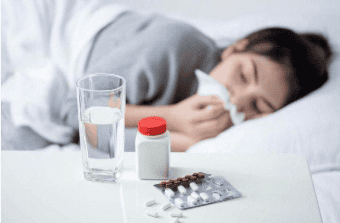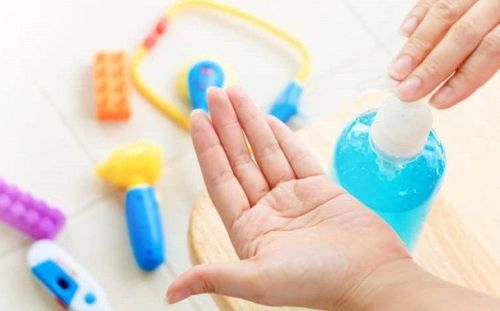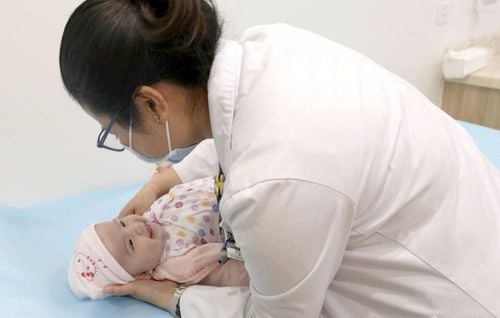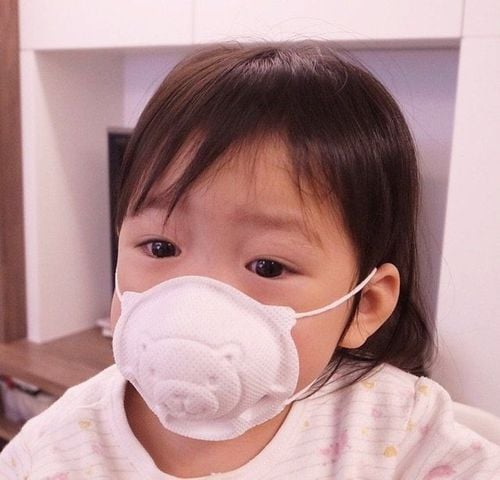This is an automatically translated article.
Covid-19 is a disease with similar symptoms to colds, flu, allergies, so it is easy to confuse. Therefore, the best way to confirm the disease early is to perform screening tests when there is contact with people returning from epidemic areas with symptoms of the disease.
1. What is COVID-19?
COVID-19 is a virus that causes respiratory infections. It is capable of causing disease in both the upper respiratory tract (sinus, nose, throat) and lower respiratory tract (trachea, lungs). The disease is caused by a strain of corona virus called SARS-CoV-2.
The SARS-CoV-2 virus spreads rapidly through person-to-person contact, causing mild to severe infections depending on the patient's immunity.
SARS-CoV-2 is one of 7 strains of corona virus, including strains that have caused serious pandemics such as Middle East respiratory syndrome (MERS) and severe acute respiratory syndrome (SARS). Other strains of corona virus cause only common colds, pose little serious threat to healthy people.
At the beginning of 2020, after the covid epidemic broke out in December 2019 in China, the World Health Organization identified SARS-CoV-2 as a new corona strain. The outbreak quickly spread around the world, and our country was no exception. The covid epidemic in Vietnam began on January 23 after the first case was detected.
2. How to distinguish COVID-19, colds, flu and allergies?
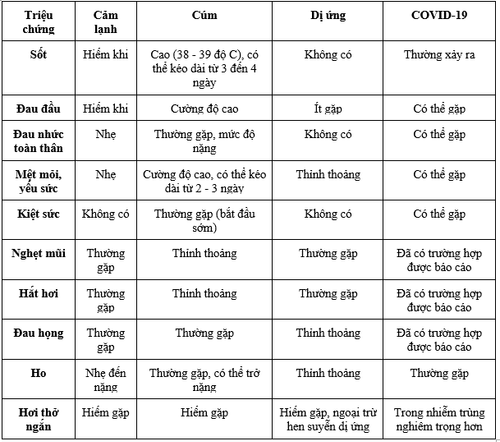
Điểm phân biệt-cảm lạnh, cảm cúm, dị ứng, Covid-19
Symptoms of COVID-19 can be similar to those of a cold, flu or allergies. Accordingly, doctors will suspect COVID-19 if you have:
Fever and cough . Live in an area with the virus or have traveled to areas with outbreaks.
Trắc nghiệm: Bạn có phân biệt được chính xác cảm lạnh và cúm mùa?
Cảm cúm và cảm lạnh là hai khái niệm mà chúng ta thường đánh đồng nó giống nhau, không phân biệt rõ ràng. Dưới đây là một số câu hỏi trắc nghiệm, giúp bạn có thêm những kiến thức phân biệt cảm lạnh và cảm cúm. Từ đó, có những biện pháp điều trị bệnh phù hợp.3. Is COVID-19 more severe than the flu?
Unlike the flu , no one is immune to the SARS-CoV-2 virus, as it has only appeared recently. This means that anyone can get the disease. Covid-19 also has a higher rate of severe illness and death than flu. But symptoms can vary from person to person.
4. Is COVID-19 seasonal like flu?
Some studies have found that high temperatures and humidity can help slow the spread of the virus. However, better weather does not help repel the disease while people have no sense of self-protection. In addition, past flu pandemics have occurred year-round, so Covid-19 disease may also have this possibility.
5. Symptoms of COVID-19
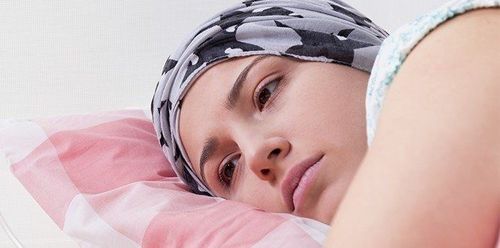
bệnh nhân có dấu hiệu mắc COVID-19 thường có triệu chứng mệt mỏi, ớn lạnh và đôi khi có rét run
Key symptoms of COVID-19 include:
Fever Cough Fast breathing Tiredness Chills, sometimes with chills Body aches Headaches Sore throat Loss of smell or taste Nausea Diarrhea Covid-19 can cause pneumonia, respiratory failure, septic shock and death. The disease can also cause many other complications due to the occurrence of cytokine release syndrome or cytokine storm. This is an infection in the body that activates the immune system, which contains cytokines (inflammatory proteins) found throughout most of the blood vessels. They can kill tissues and damage organs in the body.

Bạn có vấn đề về hơi thở cần phải tìm kiếm sự giúp đỡ y tế ngay lập tức
If the following serious symptoms develop, seek medical help immediately:
Problems breathing or rapid breathing Chest pain or persistent increase in chest pressure Increased confusion Ambiguity, confusion, blue lips or face Strokes have also been reported in some people with COVID-19. Therefore, you need to remember the following symptoms of a stroke:
Face: One side of the face is paralyzed or drooping. Arm: A weak or numb arm. If you try to lift both arms, one arm will sag. Speech: Unable to speak clearly. You should ask the patient to repeat his statement to check. Time: Every minute counts for someone showing signs of a stroke. Need to call 911 immediately. If you are infected, symptoms may appear after as little as 2 days or as many as 14, depending on the person. According to the researchers, these are the most common symptoms in people with COVID-19:
Fever 99% Fatigue 70% Cough 59% Loss of appetite 40% Fatigue 35% Shortness of breath 31% Mucus/sputum 27 % Some people hospitalized with COVID-19 develop dangerous blood clots, including in the legs, lungs, and arteries.
6. Diagnosis of Covid-19 disease

Sốt từ 100 độ F trở lên
Call your doctor or local health facility if you are likely exposed and develop symptoms such as:
Fever of 100 degrees F Cough Shortness of breath A “swab” test is ordered to look for Search for viruses in the upper respiratory tract. The test is done by inserting a cotton swab into the nose to collect a sample from the back of the nose and throat. The sample is sent to the laboratory and processed. A negative result means that there is no virus or there is not enough virus to measure (occurs in the early stages of the disease). Results are usually available 24 hours after the test is performed. In addition, blood tests for antibodies are also performed.
The “swab” test only identifies the presence of the virus at the time of the test, but the antibody test can tell if you have ever been exposed to the virus, even if you have no symptoms. There are no at-home testing kits that can definitively test for Covid-19. The FDA is being more aggressive with the products sold in this market.
7. What to do when COVID-19 is suspected?
If you feel unwell, stay home, even if you have mild symptoms such as headache and runny nose. This helps doctors focus on more severe patients and reduces the risk of community transmission. Call your doctor if you have a fever, cough, and trouble breathing. Calling ahead allows your doctor to direct you to the right place. If you do not have a primary care physician, call your local health facility to find out where to get tested and treated. Following your doctor's advice and keeping up with the news about COVID-19 will help you get the care you need and information on how to stop the virus from spreading.
8. Is there more than one strain of SARS-CoV-2?
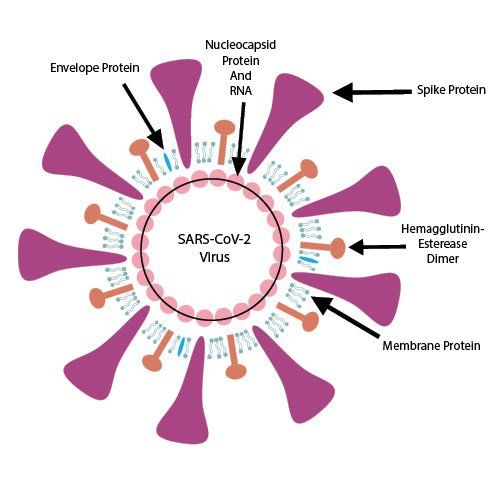
Virus SARS-CoV-2
The SARS-CoV-2 virus has the ability to mutate into a new strain when infecting humans, which is a very common phenomenon. A study in China of 103 COVID-19 cases found variants of SARS-CoV-2 named L and S. The S form came first, but the L was the more common form in the early stages. during an outbreak. They also think that the L strain has a higher prevalence than the S strain and are working on its significance in clinical applications.
9. When will the COVID-19 epidemic end?
Currently, there is still no confirmation on when the epidemic will end. It depends on many factors such as new findings by scientists in the time it takes to research the virus, the time it takes to find treatments, and the community's efforts to slow the spread of the disease.
10. Who is at risk of severe Covid-19 disease?

Những người trên 65 tuổi nguy cơ mắc bệnh Covid-19 mức độ nặng
People over the age of 65, people living in nursing homes or long-term care facilities, people with weakened immune systems, or the following are more likely to contract covid-19 than for normal people:
High blood pressure Heart disease Lung disease Kidney disease requiring dialysis Severe obesity Diabetes Cancer
11. Prevention of covid-19 disease

Rửa tay thường xuyên bằng xà phòng phòng ngừa bệnh covid-19
Wash your hands often with soap and water or clean them with an alcohol-based sanitizer to kill viruses on your hands. Practice social distancing: You, like everyone else, have the ability to contract and spread the virus to the community, so you need to spend as much time at home as possible. If you must go out, you should stay at least 2m away from other people. Cover your nose and mouth in public: If you have COVID-19, you can infect others even if you don't have symptoms. When going out, you need to wear a mask and keep a distance of at least 2m from people around. You do not need to use a mask for medical staff and should not wear a mask for: Under 2 years of age Difficulty breathing Person who is unconscious or unable to perform the act of removing and wearing a mask for some reason any other. Don't touch your face: The coronavirus can live on surfaces you touch for several hours. If they get on your hands and you use it to touch your eyes, nose, or mouth, the virus can enter your body. Clean and disinfect: You should clean frequently touched items such as countertops, doorknobs, light switches, toilets, faucets, and sinks with soap and water. You should use cleaning agents that have been shown to be effective in killing the corona virus. You should also wear gloves while cleaning and throw them away when you're done cleaning. There is no evidence that herbal remedies and teas can reduce the risk of infection.
If you have a need for consultation and examination at the Hospitals of the national health system, please book an appointment on the website for service.
Please dial HOTLINE for more information or register for an appointment HERE. Download MyVinmec app to make appointments faster and to manage your bookings easily.




